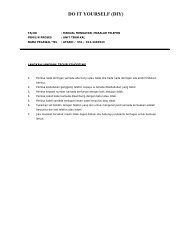chapter 6 - Malaysia Productivity Corporation ( MPC)
chapter 6 - Malaysia Productivity Corporation ( MPC)
chapter 6 - Malaysia Productivity Corporation ( MPC)
Create successful ePaper yourself
Turn your PDF publications into a flip-book with our unique Google optimized e-Paper software.
PRODUCTIVITY PERFORMANCE OF THE AGRICULTURE SECTOR<br />
Furthermore, a Centre of Excellence has been<br />
established in UPM to undertake R&D on the<br />
unique health benefits of EBN, and development<br />
of other downstream products. Other enablers<br />
that can assist in the development of this industry<br />
are the provision of sufficient export licences and<br />
funding for clinical trials to substantiate health<br />
claims.<br />
186<br />
from the nests, and air-dry vacuum and calibrators<br />
to dry the nests, as well as to ensure a uniform shape<br />
in the packaging of EBN. Increased automation<br />
resulting in consistent quality will also ensure that<br />
<strong>Malaysia</strong>n producers maintain their standing in<br />
the global market. The private sector will invest<br />
in processing plants and associated structures,<br />
whereas public sector funding will be for research<br />
and development, enforcement and traceability.<br />
The Kappaphycus seaweed is highly sought after in<br />
the processed food and pharmaceutical industries.<br />
The current low average yield of 1.5 metric tonnes<br />
of dried seaweed per hectare for the cultivated<br />
area of 8,000 hectares is the result of traditional and<br />
labour intensive farming practices. The seaweed<br />
mini-estate initiative aims to increase the farmed<br />
area to 28,000 hectares and the productivity to five<br />
metric tonnes per hectare. Public sector funding<br />
will include infrastructure such as nurseries, drying<br />
and storage facilities.<br />
Swiflet Premises<br />
The seaweed mini-estates will be managed by<br />
the Special Purpose Vehicle (SPV) formed under<br />
Yayasan Universiti <strong>Malaysia</strong> Sabah (Yayasan UMS).<br />
UMS will be responsible for research on improved<br />
farming technology and product development,<br />
as well as assist anchor companies with farm<br />
operating procedures and extension services. So<br />
far, 3,000 hectares have been gazetted for seaweed<br />
farming in Sabah with the establishment of the<br />
The establishment of <strong>Malaysia</strong>n-owned processing Seaweed Industrial Zone; the total production<br />
facilities will enable EBN to be processed locally. in 2011 was 34,941 tonnes. The first batch of 11<br />
In 2011, 10 new EBN collection and raw-clean participating companies selected for seaweed<br />
processing centres were built, along with seven cultivation will manage 200-hectare clusters and<br />
VHM-certified farmers linked to these clusters will be trained and<br />
offered apprenticeships.<br />
3 processing plants. New EBN<br />
processing technologies include auto-air pressure<br />
vacuum machines for the separation of fur from<br />
the nests, ultraviolet lighting to eliminate bacteria 3 Veterinary Health Mark



